

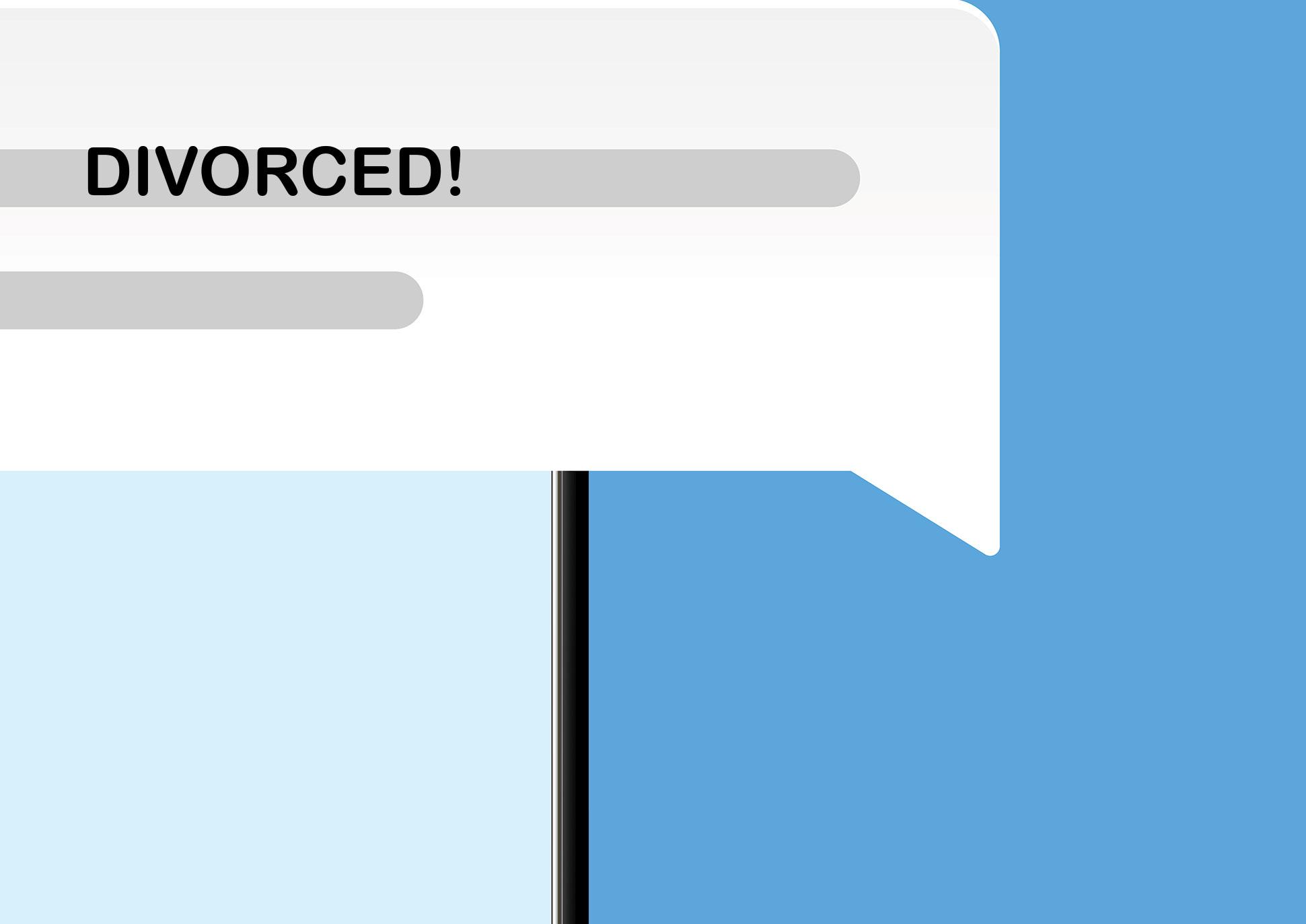


about the cover
A rare picture taken of the inside of the Qubbat al-Sakhra (Dome of the Rock) in Jerusalem, Palestine.








A rare picture taken of the inside of the Qubbat al-Sakhra (Dome of the Rock) in Jerusalem, Palestine.




here are two ways of seeing things: a negative and a positive. The prophetic way was always positive and optimistic. In the Qur’an too, Allah says, “Along with the hardship will be ease” [94:5]. Don’t be bogged down by the hardship, but see the ease that accompanies it. Dr. Kamran Karatela in his profound article on Gaza does just that. In his month long stay in the embattled region, he witnessed the aftermath of the most horrific form of ethnic cleansing in modern history. But, he also witnessed the compassion, resilience, empathy, and dignity of the victims of the genocide, which he reveals in his firsthand account. In a sense, he is saying that the help of Allah is imminent for Allah never abandons the oppressed especially so, if they are believers in Him. In hardship, the good and bad is revealed. The compassion and resilience of the people of Gaza has only proven to a silent world that they are veritably good, in which case the nusra of Allah is just a matter of time. There is much written in the Seerah books on the Isra’ (Night Journey) and Mi’raj (Ascension) of the Prophet s, but Maulana Dr. Mateen Khan covers the two extraordinary miracles with his elegant prose in the most vivid way. Though intertwined, the Isra and Mi’raj are two distinct miracles of which the former is cited in the Qur’an while the second in the authentic hadith. Belief in these two is essential to our creed and signifies the transcendence of naql (tradition) over ‘aql (intellect) in Islam. Though we may not comprehend it, we believe and proclaim, “We hear and we obey.”
Patron
Hazrat Dr. Ismail Memon
Fatawa
Mufti Husain Ahmad Badri
Contributors
Mufti Omar Baig
Maulana Dr. Mateen Khan
Dr. Kamran Karatela
M. Zubair Ahmad
M. Ahmad Amin
Editor
Asim Ahmad
Phone 519 360 1028
E-mail office@ducanada.org Website www.ducanada.org
Address
51 Prince St. N, Chatham, ON N7M 4J7, Canada
The views expressed in the columns of Insight magazine do not necessarily represent those of Darul Uloom Canada.
The articles published in this magazine may be reproduced with due acknowledgment .

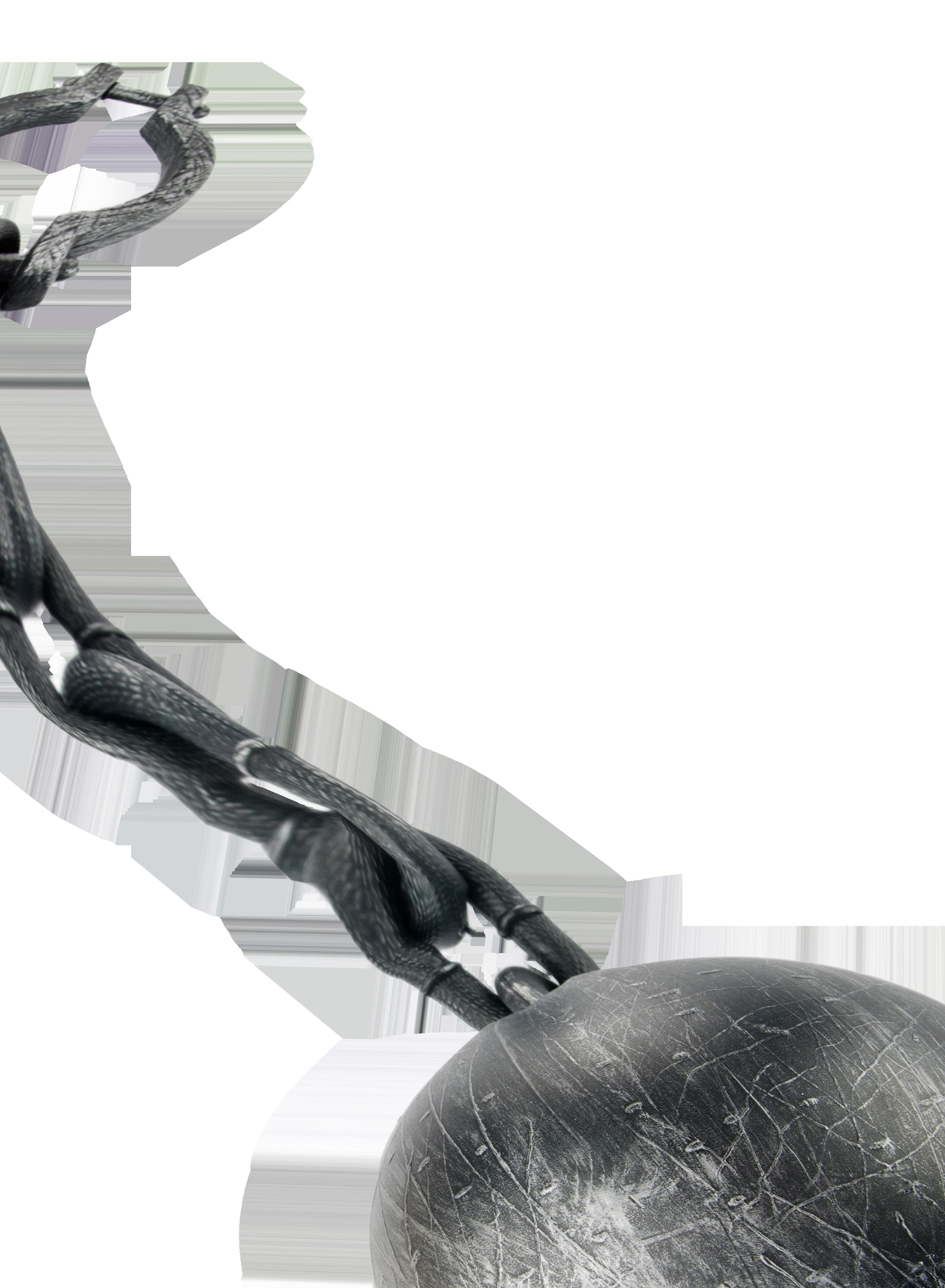
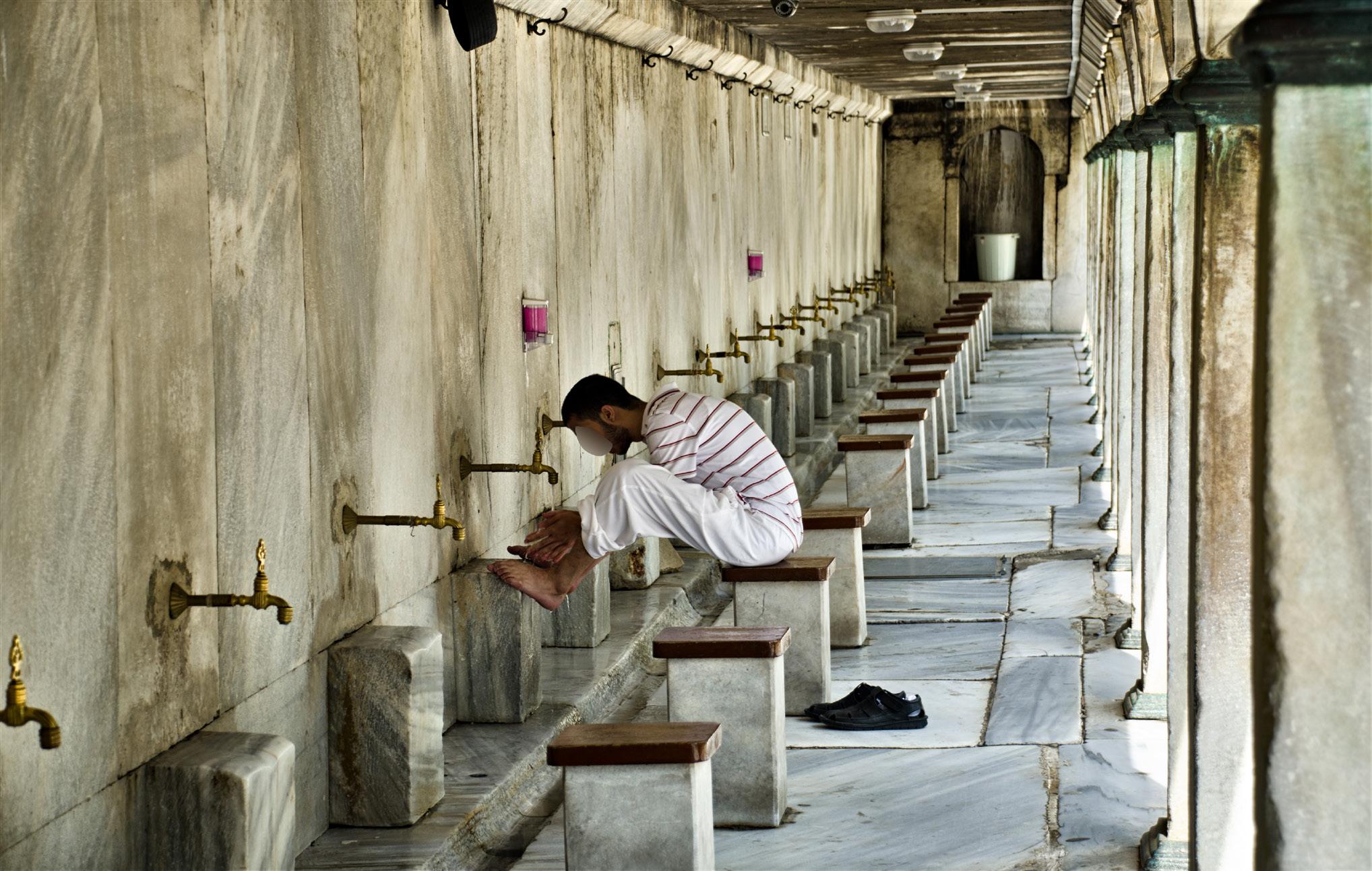
hat do you think this man is up to after he completes his wudu?
would he be performing wudu?
salat without purification” (Tirmidhi; 1/51 | Ibn
own especially when the above hadith above makes no such claim that wudu is a virtue of
was it that the Prophet s was always mindful of being in wudu even when he was in a state of major impurity [i.e., requiring ritual bath], even though wudu cannot rid one of major impurity?
And, why did he always perform wudu before performing ritual bath from major impurity (Bukhari; wudu qabl al-ghusl)? What was the need if he already was achieving purification with the ritual bath?
And then, he told ‘Umar g that if he is ever in a state of major impurity and wants to sleep without ghusl, he should perform wudu first [Bukhari; al-junub yatawadd’u thumma Yanam].
which basically means that most of our day is
But if wudu is only ritual purification, then why

Furthermore, the Prophet s remained in a perpetual state of wudu [Muslim: jawaz al-salawat kulliha bi wudu’in wahid], and likewise the Sahaba [Bukhari; wudu min ghayr hadathin]. Some hadith even suggest he was obligated to perform wudu for every
salat though it was later abrogated and reduced to making miswak for every salat. Ibn Umar (ra) and other Sahaba too routinely performed wudu for every salat regardless of whether they were in a prior state of wudu or not [Tirmidhi; wudu li kulli salat | Sunan al-Darimi; idha qumtum ila al-salat 1/521].
To me, it was clear from these and numerous other hadith that wudu is a virtue in itself and that to assume that its inseparability from salat proves its irrelevance to the life of a believer is a gross misunderstanding.
Yes, it’s permissible to be in a state of minor impurity outside of salat, but which true believer can be pleased, or even indifferent, to a body soiled with impurities just because they are not about to pray salat?
Firstly, the fact that wudu is a protocol for a believer to enter the court of Allah proves that a believer who is in wudu is in proximity to Allah, and that Allah hears and responds to the pleas and invocation of a believer in the state of wudu more than one without.
Secondly, a believer is more inclined to pray while being in wudu because he has the key to enter the Splendid Court whenever he desires.
Thirdly, being in a state of purification attracts the angels and repels the shayateen [p. shaytan] because shaytan is attracted to impurities the way angels and humans are naturally attracted to fragrance and good scent. The Prophet s taught us to recite the du‘a, “O Allah, I seek refuge in you from the khubuth (male shayateen) and khaba’ith (female shayateen)” [Muslim; 1/283], because shayateen dwell in places of impurity. Angels, on the other hand, love purity and are repelled by bad smell. Abdul Kareem al-Khadeer in his commentary of Tirmidhi says, “Shaytan enters where the angels do not” [3/15]. In addition, angels refuse to enter the home of a person who is in a state of major impurity unless he has performed wudu [Abu Dawud; fi al-khuluq li al-rijal].
In another hadith: “They [i.e., angels] are bothered by the very things that bother us” [Muslim; nahi
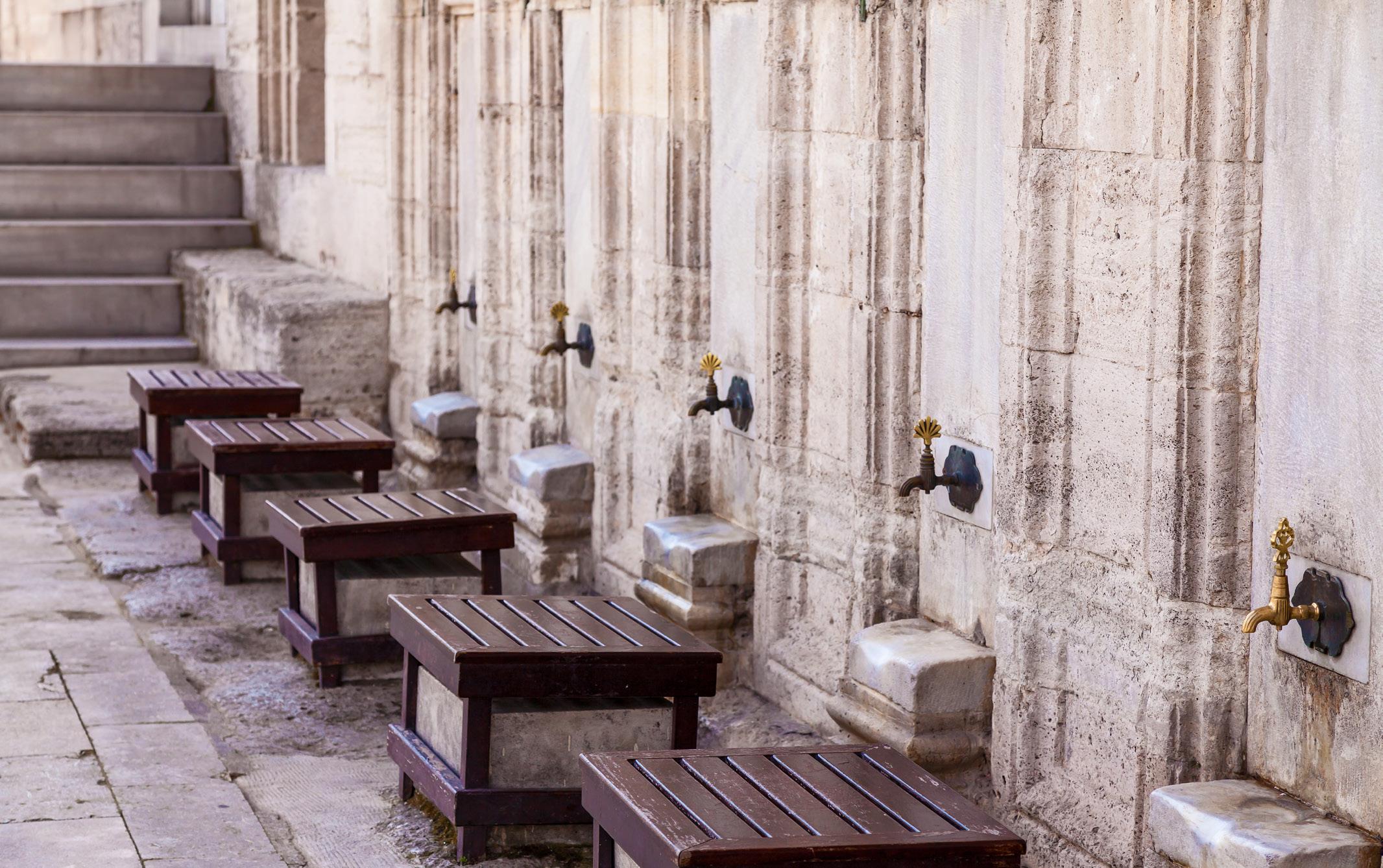

man akala thuman]. Like us, they are bothered by impurities and excrement, yes, and bad breath too. This is why the Prophet s, in a sense, shunned pungent-smelling foods [i.e., onions and garlic] from his life because of the archangel Jibril’s e frequent, unannounced visits. Ibn Khuzayma says this rule [i.e., the Prophet s avoiding pungentsmelling foods] was exclusive to the Prophet s and he even dedicates a chapter as follows: Chapter on the proof that the Prophet s was excluded from eating this [i.e., onion] because of his munajat (whisperings) with the angels [Sahih Ibn Khuzayma; 2/806].
What it boils down to is that if a believer remains in perpetual wudu, the shayateen keep their distance and he is in the company of the angels, while if the believer is in a state of minor impurity, the
shayateen accompany him and the believer is corrupted by their bad company. He is more forgetful of Allah. He is more affected by bad thoughts, more inclined to evil and more susceptible to the deceptions of shaytan—and Dajjal who is called the Prince of Darkness and Evil. Perpetual wudu is hateful to his being, because as the next point adduces, wudu illuminates the limbs and forehead while He feeds on darkness and evil.
A perpetual wuduist is, thus, saved from his dark fitna.
Fourthly, wudu illuminates the limbs that are washed in wudu. The more we keep our limbs illuminated with wudu, the brighter they will shine on the Day of Judgment and the quicker the Prophet s will recognize us Latecomers. Once, the Prophet s visited a graveyard with a group of Sahaba l. On his way back, he said I wish I could see our brothers.
The Sahaba l asked, “Aren’t we your brothers?”
“You are my companions. My brothers are those who will come after me and have not seen me.”
One sahabi asked, “If you haven’t seen them then how will you recognize them, Prophet of Allah?”
He said, “What do you think of a person whose piebald horse [white markings on forehead and feet] is among a herd of all-black horses, will he recognize his horse?”
They said, “Of course.”
“They will come on the Day of Judgment with illuminated foreheads and limbs from the effects of wudu” [Ahmad 13/373 | Ibn Khuzayma 1/6 | Muslim 1/217 (with slight variant wording].
Yes, it’s permissible to be in a state of minor impurity outside of salat, but which true believer can be pleased, or even indifferent, to a body soiled with impurities just because they are not about to pray salat? Solution?
If we can make the habit to never leave the
bathroom after attending the call of nature without performing wudu, we would become perpetual wuduists.
One more thing. When we perform wudu, the sins of the limb with which those sins were committed are rinsed out with the water, including “under the fingernails” [Muslim; khuruj al-khataya ma maa’ al-wudu].
The sins we committed with our mouths, our eyes, and ears, and the mind—dirty thoughts and the states of ignorance etc. are all washed off. Now that you performed wudu, you remain in a state of purity. In fiqh books, this water that falls from wudu is called musta’mil (used). It is pure but cannot be reused for wudu because it contains the excrement of sins. Its too bad we cannot see sins in their real ugly form, otherwise we would be relieved to have all that filth soiling our souls separated from our bodies.
Note for the sisters
Even for sisters on their period, remaining in perpetual wudu comes with all the benefits mentioned above. The angels will enter the home of a believing brother/sister even while they are in the state of major impurity for as long as they are in wudu. n
WU D H U S U N N A
Author: Asim Yusuf
Pages: 350
Many fiqh discussions are seasonal, gaining attention only at specific times of the year. like moonsighting before Ramadan, ‘Eid al-Fitr, and ‘Eid al-Adha but is rarely discussed otherwise. Similarly, the timing of Fajr and Isha prayers is most frequently debated during the summer when Isha is late and Fajr is early. With various views on the exact start times for Fajr and Isha, people often wonder about the origins of these differing opinions. The book is essential for anyone seeking a thorough background and understanding of this issue.
Shedding Light on the Dawn is a scholarly examination of the complexities surrounding the times for Fajr and Isha salat. The author discusses the varying perspectives held by classical jurists from different schools of thought and the contemporary debates on the degrees of solar depression that determine these prayer times. Below are some of the main features of the book:
1. Fajr and Isha Times:
by Mufti Omar Baig
tional methods over fixed calculations (that have not factored in what can actually be observed by the eye) for determining accurate prayer times, especially in regions with unique astronomical conditions.
3. Classical and contemporary juristic opinions:
The book provides a detailed discussion of the classical juristic opinions from various schools of thought regarding Fajr and Isha times.

The book provides an in-depth analysis of the times for Fajr and Isha prayers, focusing on the complexities that arise in high latitudes where twilight is prolonged or nights are short. Yusuf discusses the traditional and contemporary views on the degrees of solar depression that determine these prayer times.
2. Scientific and Sharia Definitions: Yusuf explores the scientific and Sharia definitions of twilight, examining whether these definitions overlap and how they impact the determination of prayer times. The book emphasizes the importance of observa-
Yusuf also addresses contemporary debates and differences among scholars, presenting a balanced and respectful analysis of these viewpoints.
The Subh Project:
Yusuf includes his own observational study, the Subh Project, conducted in the UK to determine the accurate timings of dawn and twilight.
The study’s findings are presented in detail, offering practical insights and contributing to the broader discussion on prayer times. Yusuf also discusses and summarizes past observations made on the salah times. He also highlights potential gaps or factors that may have affected their research.
Shedding Light on the Dawn is an essential read for those interested in Islamic jurisprudence, particularly prayer times and astronomical phenomena. The book’s thorough analysis and balanced presentation make it a significant contribution to both classical and contemporary discussions. It is especially valuable for scholars, students, and anyone interested in understanding the difference of opinion regarding the prayer timings.
Disclaimer:
This book review does not endorse all the fiqh views held by the author nor his final recommendations.
to control and restrain oneself. One of the last people to enter Jannah after being saved from the Hellfire will promise Allah he will not ask for anything more. Then, he will hear the voices of the people of Jannah and will not be able to control himself [lam yatamalak] and will say, “O my Lord, enter me into Jannah [Ahmad: 18/207].
al-Milk [p. amlak] property, possessions, goods and chattel.
al-Malak [p. al-mala’ika]
Amgel, as Allah says, “Say, if there were upon the angels [mala’ika] walk ing securely, We would have sent down to them from the heaven an angel [malak] [as a] messenger [17:96].
al-Mulk
Kingdom, dominion, and ladhi bi yadihi malakutu whose hand is the dominion said to Abu Sufyan, “The emerged,” after he read the the Prophet
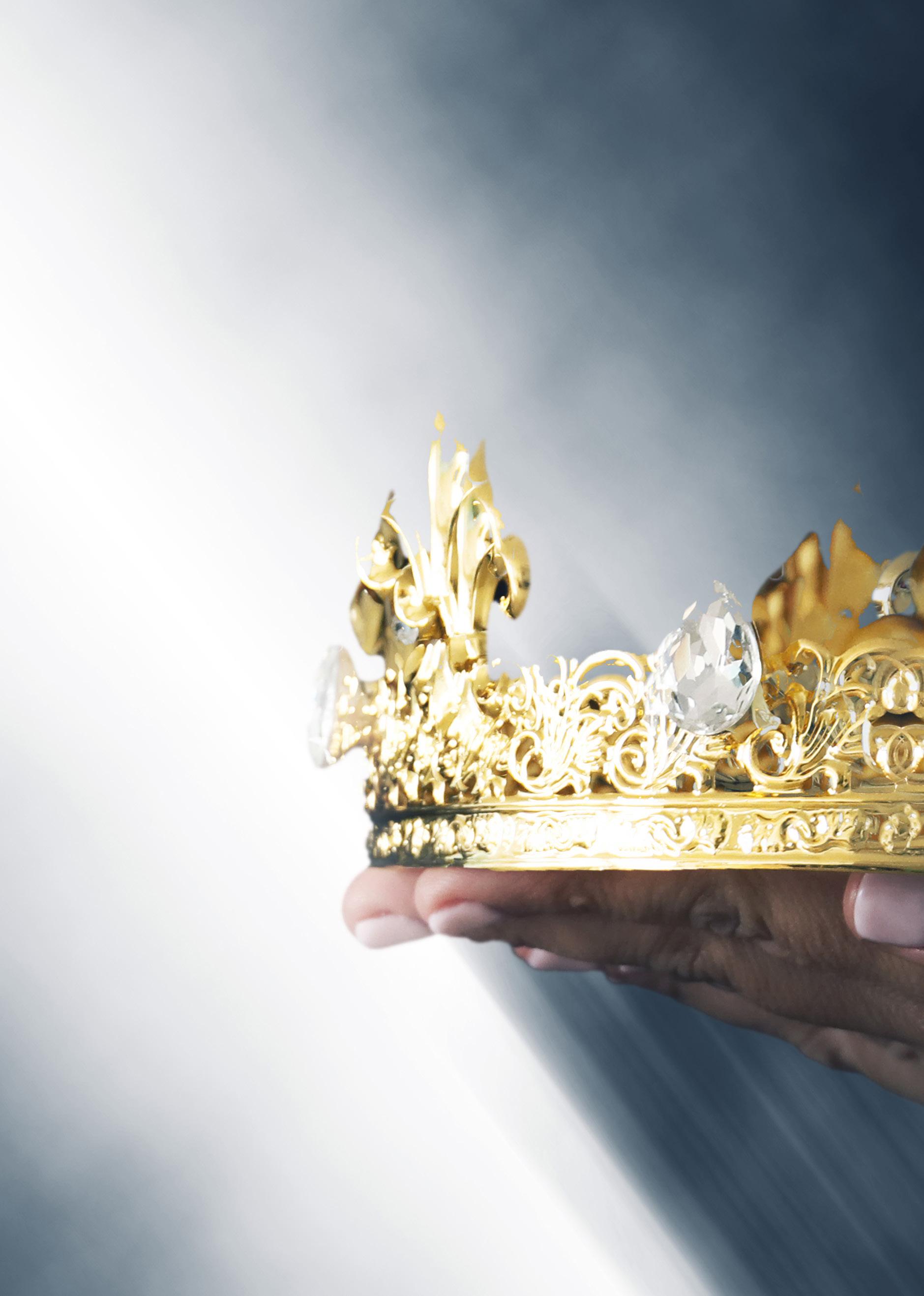
Malaka yamliku means ‘to dominate, control or to take possession.’ Malakahu al-ghayzu or, anger overwhelmed him, because when one is livid, anger takes possession of them. This root meaning is found in most of the forms and inflections of malaka. al-mala’ika] there walkdown angel
al-Mulk and Malakut and ownership as in: fa subhana alkulli shay’, so exalted is the One in dominion of all things [36:83]. Heraclius kingdom [mulk] of this umma has the stars and predicted the coming of Prophet s [Bukhari, 1/7].

al-Malik the King is only Allah. He is Malik al-Mulk, the King of all Kings. The kingdom is His. He is Malik al-Khalq, the King of all Creation, their Sustainer and their Owner. Ibn Katheer, Nafi’, Ibn ‘Amir , and Hamza read the ayah of Sura Fatiha: Malik yaum al-deen (Owner of the Day of Recompense).
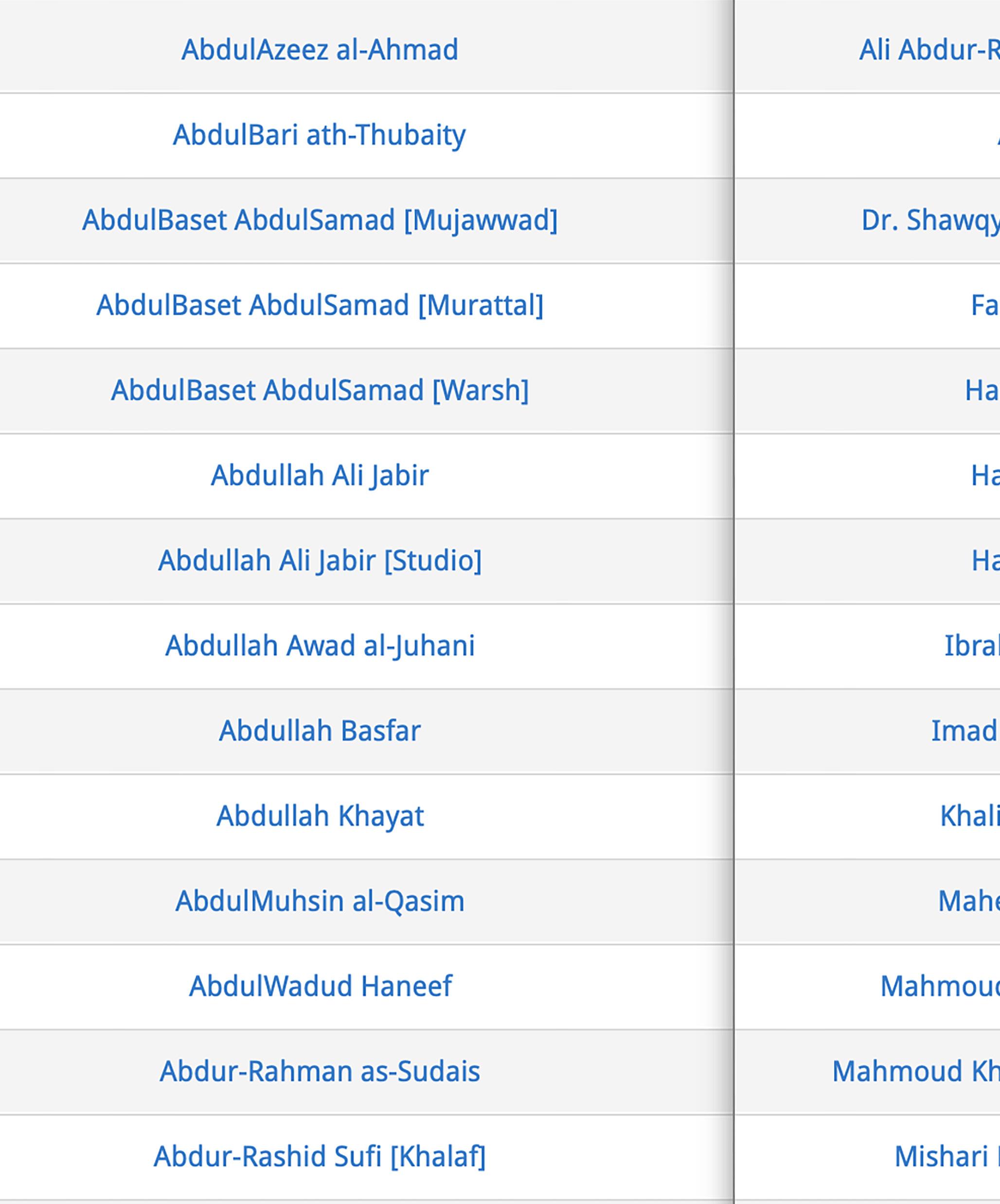

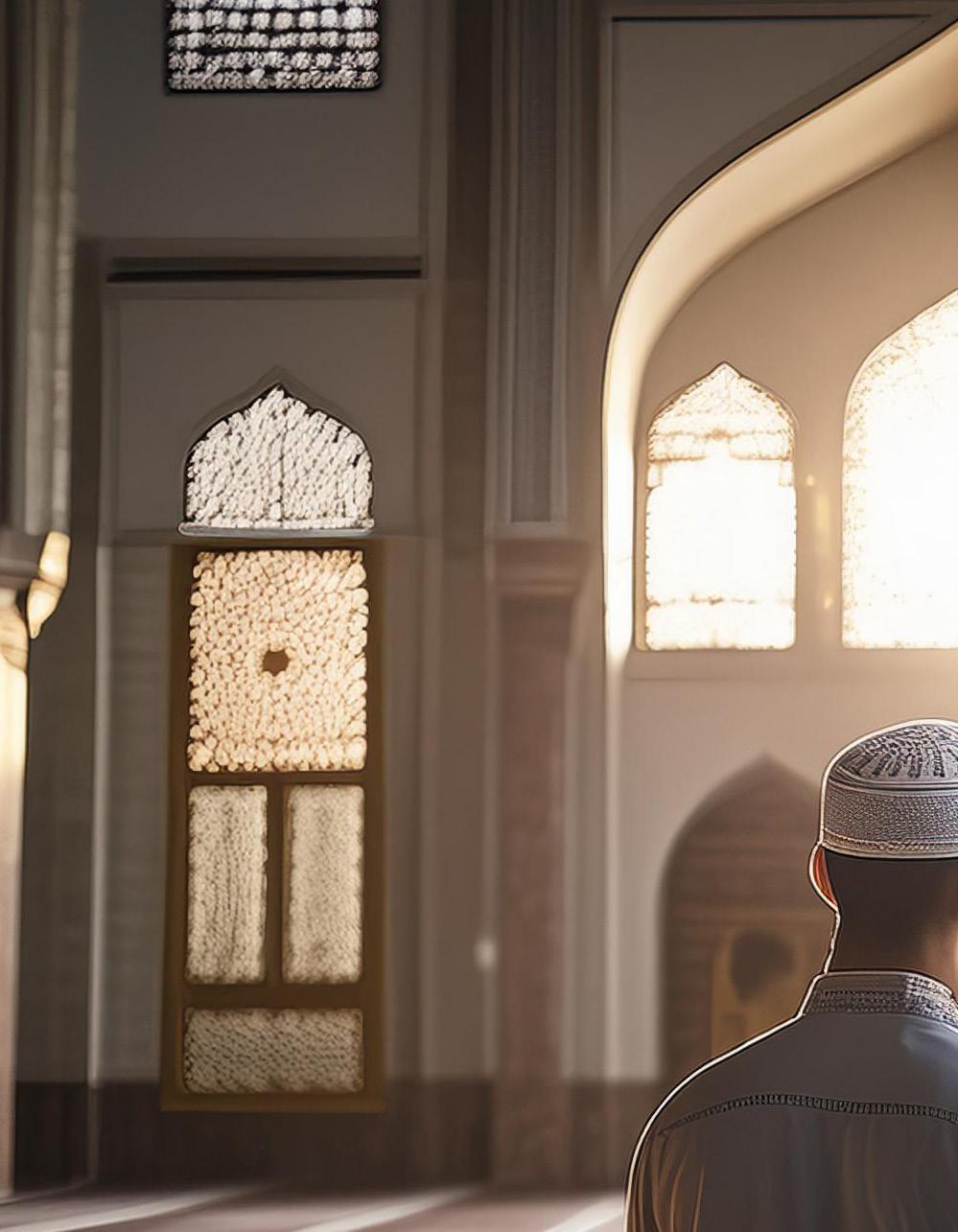
Of the signs of the nearness of the Hour is the increase in reciters of Qur’an and scarcity of fuqaha {Kanz al-’Ummal}





QWhat are the virtues of fasting on the day of Ashura? Is it necessary for a person to fast on both the 9th and the 10th or is one day enough?
AIt is narrated in a hadith that the Prophet s encouraged fasting on the Day of ‘Ashura (10th of Muharram) saying, “Fasting on the day of Ashura, I anticipate that Allah will expiate (the sins of) the year before it” (Muslim).
Ibn ‘Abbas k was also asked about fasting on these days to which he replied, “I do not know Allah’s Messenger specifically mentioning the fast of any day and considering it more excellent than another except this day (the Day of Ashura) and this month (i.e., the month of Ramadan) (Muslim).
Both opinions are found in this matter. If one could fast both days (9th and 10th or 10th and 11th), he should strive to do so. If one cannot, he may suffice with fasting on the 10th.
QI have begun making up for the qaa salat I missed throughout my life. Can praying my qada prayer be enough to count as tahajjud salat, or should I pray nafl separately for tahajjud?
AIt is extremely important and commendable for Muslims to make up any qada (missed) salat that they missed throughout their life. May Allah grant steadfastness and accept this worship. Although it is ideal to perform qada and tahajjud separately, performing the qadha during the time of tahajjud salah will still garner the reward for performing tahajjud, insha’Allah.
QWhat is sadaqa? Can a person give sadaqa to his parents and relatives?
ASadaqah refers to a virtuous deed or act of kindness without expecting anything in return, it is a voluntary act from which the donor expects a reward from Allah. It can be monetary aid, a smile, or lending a helping hand. Unlike zakat, which is compulsory, sadaqah is entirely voluntary and can be given at any time of the year. There are no limits to how much one may give in sadaqah.
One may give as much as he feels necessary within one’s financial means to sustain one’s parents. There is even more reward in giving sadaqah to your parents. You can use sadaqah money to build a house for your parents or even construct a madrasah (seminary). The intention behind giving sadaqah can also be on behalf of deceased parents or relatives.



QA husband was texting his wife and typed ‘I’ followed by ‘di’, which the phone’s autocorrect feature changed to ‘divorce’ without his intention. Would this unintended autocorrected word constitute a valid talaq?
AThe autocorrected word ‘divorce’ does not constitute a talaq as it cannot be attributed to the husband. Rather, it would be attributed to the autocorrect feature. Therefore, in the scenario mentioned above, divorce did not occur.
Question: Can a woman perform wudhu while wearing nail polish?
AAnswer: If the qibla direction indicated on your phone varies. you can employ alternative THE AUTOCORRECTED WORD
DOES
nswer: For wudhu to be deemed valid, water must come into direct contact with the surface of the nails. Nail polish prevents water from reaching the nail surface, thereby rendering the ablution invalid.
Q
uestion: Once, I was at the airport and it was time for Isha salat. I was using the qibla and compass app to find the qibla direction, but the results varied. Which direction should I face for prayer?

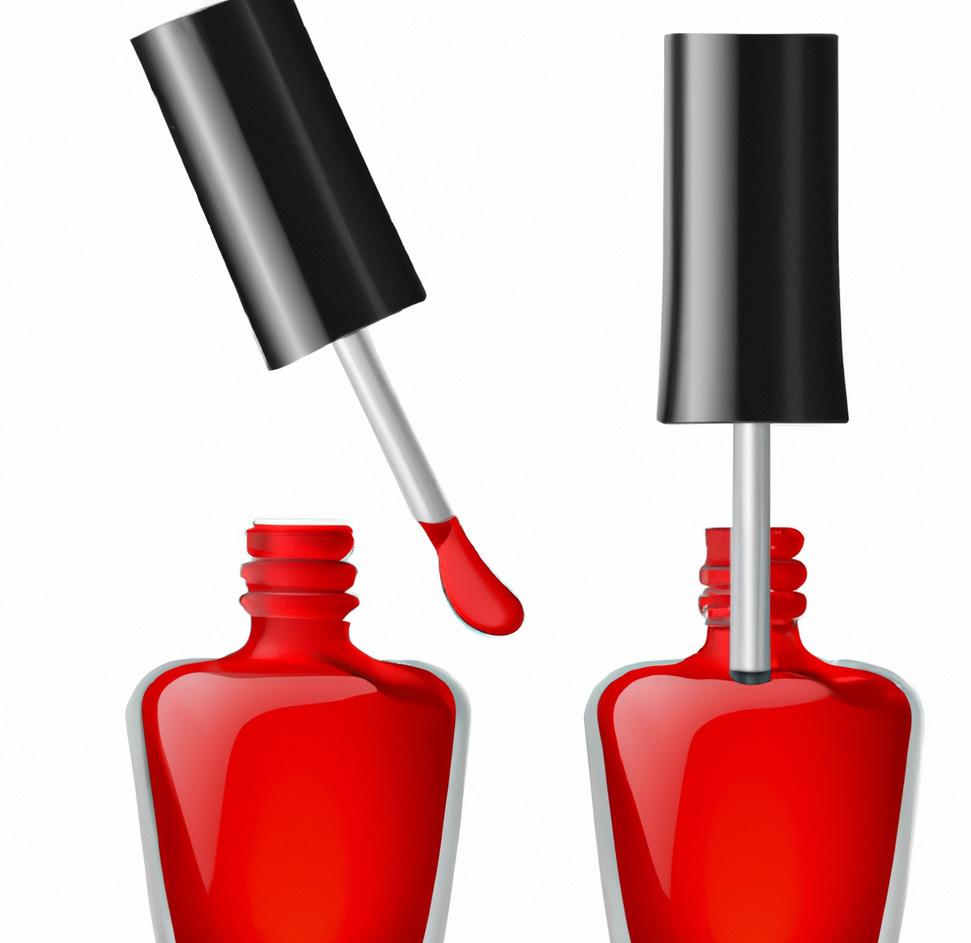
reliable methods to approximate the qibla direction. Such methods include using a physical qibla indicator or a qibla compass. Additionally, if you are familiar with the general direction of the qibla in your location, you can use a map to determine its exact direction.
If one is still unsure, it would be permissible to pray in the direction that one reasonably believes to be closest to the qibla, and the salah will be considered valid.
Question: We are acquiring a property, and some of our business colleagues are seeking a stake in it. They are proposing a 20% share divided into 4 shares of 5% each, while we are seeking an 80% share. The projected yield on the property is approximately 8%- 11% based on current rental income. One of the 2% shareholders has requested a 9% share of the total profits instead of the standard equal distribution. We are open to accommodating this request.Would this be permissible, or does it constitute riba?
Answer: In principle, an active partner can receive any agreed-upon percentage share. However, a sleeping partner must not receive a share percentage exceeding their initial capital investment ratio.
For instance, if partner A (Sleeping Partner) invests 20% into a business, they are entitled to only 20% or less of the total profits and cannot receive a higher percentage.
QI had started praying Asr at 6:15 and finished around 6:22. As I was sitting and reading my adhkar, my phone started playing the adhan at 6:24. I was confused as that would mean Asr time had just started. When I checked my phone, the app confirmed my suspicion and the Asr timing had just started. I crossed referenced with my local masjid timings to make sure. Will I have to repeat my wudhu and/or Asr salah again?
Answer: Since one has prayed their salah before the timing has entered, it will not be valid. One will have to repeat it once the time has entered. This will also be the ruling if one has prayed by mistake outside of any salat respective timing. However, one will not have to make wudhu again.
Question: My local masjid only has one imam, but since the community is quite large, they have two Eid prayers. However, due to a shortage of scholars in the locality, the imam leads both prayers. I prayed in the first Eid prayer, and my cousin prayed in the second Eid prayer. Will both of our prayers count?
AThere are different opinions regarding the scenario. According to the Hanafi school of thought, ‘Eid salah is wajib and can only be prayed once. This is also a type of prayer that cannot be made up if missed. Therefore, the imam can only lead one ‘Eid prayer. If the imam leads another Eid salah, that prayer will be considered a nafl prayer. The prayer of all those who attended the first Eid prayer will be fulfilled. However, those who attended the second ‘Eid prayer will not be valid since a wajib salah cannot be prayed behind an imam praying nafl. One would be advised to go to any other masjid in their locality in which the imam of the ‘Eid prayer has not already prayed ‘Eid.
EID SALAH IS WAJIB AND CAN ONLY BE PRAYED ONCE. IT IS A TYPE OF PRAYER THAT CANNOT BE MADE UP IF MISSED.

Question: Is Gellan Gum halal?
Answer: Gellan Gum is a substitute for gelatin and is made from a specific fermented bacterium. After fermentation, it is dried and milled into powder and used an ingredient in various food products. Therefore, gellan gum is a halal ingredient. However, there are recent studies showing that grape pomace is a promising source for gellan gum production. Grape pomace is residue from fermenting grapes. If this becomes the source of gellan gum, then it will be impermissible to consume.

A
physician’s personal account of what he observed unfolding in the embattled region.
As I write this account of my experience its been 264 days of gruesome war, 264 days of deaths, 264 days of destruction.264 days of world silence. We hear it. We see it. We witness it every day.More than half of Gaza’s homes, 80% of commercial facilities and 85.8% of school buildings been destroyed or damaged. Fifteen out of thirty-five hospitals are partially functioning, 83% of groundwater wells are not operational and hundreds of places of worship have been razed to the ground.
The horrific scenes well documented by on- ground journalists and the personal accounts of Gazans on social media are unveiling the on going mayhem and massacre in Gaza.
It is certainly ten times more horrific to experience it in person.
The gut-wrenching images of a wounded man lying in a packed emergency room with his gut literally spilling out, the scenes of death of the young and old, the horrific screams of the children, the deafening noise of bombs and drones. But this is not the story I am going to narrate to my readers. I want to share something different, something so powerful, I have not witnessed anything like it in the 50+ years of my life.
As we travelled in a group of 12 , an internist from Scotland, a nurse from Qatar, an OR tech from Jordan, a physician from New Jersey, a paediatrician from Texas, a hospitalist from London, Ontario, ER physicians from Toronto and humani-

tarian workers from UK-all from different ethnic backgrounds and religions carrying hundreds of suitcases filled with medical supplies, risking their lives for one mission-to save humanity. I learned quickly that humanity has no boundaries, nor any religion as we all rushed to help the victims of the most barbaric genocide and war in modern times. I witnessed care. I witnessed love. I witnessed empathy.
As I stepped into a neonatal unit, I met premature babies crying , often three or four in one incubator. I witnessed the strength and passion of doctors and nurses struggling to keep the babies alive with limited resources. When they had to make the tough decision of who to save and who to let go. I witnessed heights of responsiveness.
I met Yahah a 6 months old infant handed over by his mother after she delivered him in a taxi in North Gaza to one of the medics instructing him to take him to the south in hopes that he may survive. The baby was raised by the nurse in the peds unit. His parents status is unknown. I witnessed compassion. Amidst the bombings and suffering, I witnessed tranquility of heart when a displaced physician at the peds unit, after describing his ordeal said to me, “You know what? Despite all this, my heart is at peace and I feel a tranquility like I have never experienced before.” I witnessed tranquility of heart in the midst of death and destruction.
I witnessed sacrifice when I met an anesthesiologist who was forced

out of al-Shifa hospital at gunpoint in the north while most of his colleagues were already dead or in captivity. He was ordered not to look back otherwise he would suffer the same fate. He walked barefooted for miles toward the south and met a woman along the way. She sat on the curb with her husband’s slippers clutched in her hands until she noticed him walking barefooted. She quietly handed him the slippers, and with that, all hopes of her husband’s safe return. The doctor made his way to another hospital to the south and started work immediately upon arrival. With no food, money, clothes, this doctor was working in the Critical Care unit once again saving lives. He still wore the same slippers and the only pair of scrubs he had. He said the scrubs was more valuable to him than Eid clothes. He said that if there was any way, he would return to Shifa hospital to help his
patients.
I witnessed resilience.
I also witnessed dedication. I saw the doctors working day in and day out, some of them not returning to their homes for 7 months. Some chose to move into the hospital to attend to the crowds of patients.
I witnessed hospitality. Every evening, our neighbors who had nothing for themselves would prepare an elaborate dinner for our iftar. We were ashamed but they were adamant. The doctors I worked with would insist I stay and break my fast with them. However, we were prohibited from being outside our shelter after sunset. One day as I was leaving after work, he pushed his meal in my hands and said, “This is all I can do for you, my brother. If you had come on better days, you would have witnessed our hospitality.”
I witnessed strength of faith. We would see sick and wounded patients who would be fasting. When we
I WITNESSED CARE. I WITNESSED SYMPATHY.
asked them to break their fast, they would say, “We want to meet our Lord in the state of fasting.”
Beneath the rubble, I witnessed hope. Our neighbor, a 15 year old boy and top student at his school would share his dreams and aspirations with me. He recalled his memories from school that was now a huge pile of rubble. With a sparkle in his eyes, he showed me pictures of his beautiful house in the north which had been razed, forcing him to move in with his relatives to the south. He sat with me at night and shared his ambitions about becoming an IT professional and how he wished the war was over so he could rebuild his country. His younger brothers (6 and 9) would be playing and running around in the background, oblivious of the house they had lost to air raids. Later, I received a message that they had evacuated yet again and had now moved elsewhere.
I witnessed the power of prayers. I saw a man standing to one side staring up into the sky praying, holding the small hands of his little daughter at iftar time. Silently, he
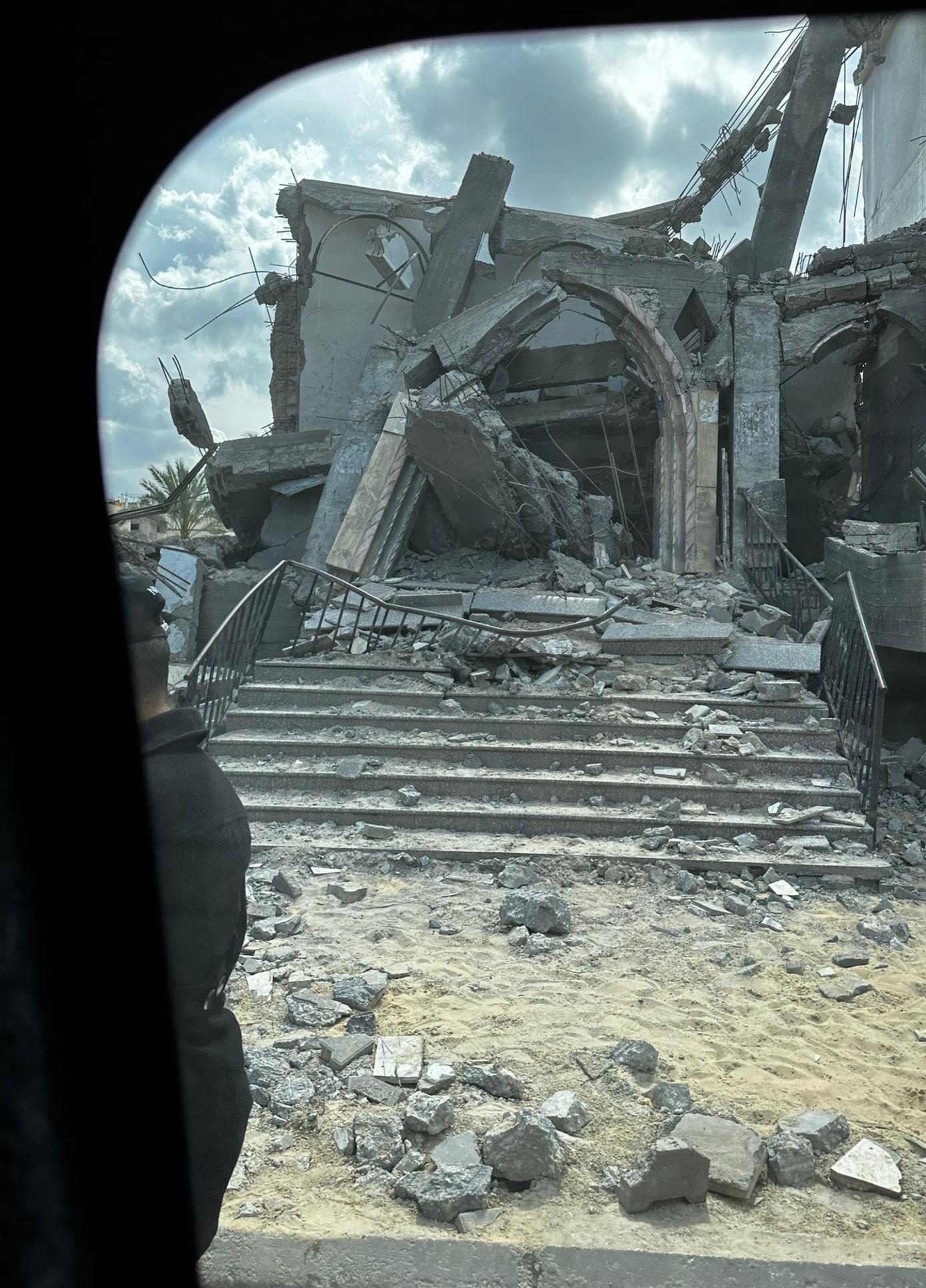


was was praying for help. We approached him and heard his story. Someone had promised him food but did not show up. He had no means of getting food for his little daughter and a family of 6 in a tent. We gave him food and clothes. I witnessed tears of joy and sorrow. I witnessed the dignity and honor of the Gazan people. Even when in destitution, they did not seek help. Even if you give them, they refuse. As I was departing, I gave my belongings to one of the doctors who refused and with tears in his eyes, said, “ We were never like this. We


would give, not take.”
What I witnessed was beyond anything words can describe . I witnessed humanity failing and succeeding at the same time. a
When a person is facing any difficulty or is overcome by grief, sickness, or has some need, then of course there is du’a like, “O Allah, fulfill this need of mine… remove this sickness or hardship I am facing”, but I will tell you a way by which Allah will certainly fulfill your need, and it doesn’t matter what the cause of hardship is. Recite salat and salam upon the Prophet s in abundance. By the blessing of the salat and salam, Allah will remove your hardship.
Deen is nothing more than changing your perspective on things… it is a small adjustment that converts the dunya into deen. All these mundane things that you were doing from before will all become ibadat and means of achieving the pleasure of Allah, but only on the condition that you make this adjustment. The first is to correct the intention and secondly completing every action according to the Sunna. By these two small changes, the very thing that is dunya will become deen. And this is the whole purpose of visiting and sitting in the company of the Elders. They change your perspective on things and your mindset. As a result, the actions and deeds of a believer are set in the right direction.


If you do something as you like and then do that very same thing with the intention of adherence to the Sunna, you will feel a colossal difference between the two. The former will be your own action that is deprived of reward and blessings while the latter will reap you the reward and blessings of adherence to the Sunna; and it will be filled with nur.
Representatives on the earth
Allah has created man with the capacity to commit evil and appointed him as His representatives. As for the creation that is free of any inclination to evil, He did not choose them as His representative on this earth [i.e., the angels). Thus, they are not deserving of representing Him on this earth. While He created humankind with the capacity to commit evil and even set an example of a wrong that was committed before placing him on this earth… i.e., Adam e made a mistake, and then He was inspired to say the following:
Oh, our Lord, we have wronged ourselves, and if You do not forgive us and have mercy on us, we will surely be among the losers (7:23). If Allah willed, He could have forgiven Adam e without revealing these words to him, but He did not.
Why?
To inform mankind that all this will transpire in the world you are about enter. Shaytan and the self within you will tempt you. Until you do not take the antidote after they entrap you, you will not live there peacefully. This antidote is istighfar and repentance. After teaching him these two antidotes, Allah sent Adam e to this world to tell him that when sin happens, this antidote will purge and purify you.
Once you have repented for your sins, then never look back at them again. In fact, forget about them altogether because to recall the sins you sought repentance from is showing ingratitude to the maghfira that Allah has promised those who make tauba and says, I will forgive your sins and erase it from your record. Instead, you are recalling
these sins and perpetuating them. This is ingratitude for His mercy. Sometimes, these past sins become a veil. Therefore, do not think about them and erase them from your memory completely.
When you have made tauba, now forget about the past because once tauba is made, then put your hopes in Allah that He will forgive by His mercy, if He wills. But you must also forget about the future that what if something does or does not happen. Be concerned only with the present, the here and now, that it passes peacefully in obedience to Allah and that no sin is commited in the present. Today, our situation is that we are either stuck in the past, constantly concerned about all the sins we committed, what will happen to us now and how will we be forgiven. We get so embroiled in the past that we despair to the extent of ruining the present. Or, we are fixed on the future wondering how we will avoid the sin after we have made tauba. But you should think of it this way: we will see when and if that time comes. Right now, you should think of nothing but the present which is passing and becoming the past while every future moment becomes the present. Therefore, focus on your present and stop despairing and delving into your past. In reality, Shaytan is playing us. He tells us to look into all the wicked sins we committed in the past and tells us, “What is going to happen to your future?” By entrapping us in the past and future, he aims to destroy our present. a -sayings of Dr. Abdul Hayy Arifi

Eleven years had now transpired since the moment when Sayyiduna Jibrīl presented himself to the Prophet s in the cave of Hirā’. The Muslims emerged from a debilitating boycott, and the Prophet s lost his two protectors, Abū Tālib and Khadījah j.On top of that, he returned rejected from Tā’if, having endured tiring humiliation and trial. The world felt tight around him, making it hard to breathe despite its vastness. At this lowest point, Allah the Exalted destined to honor His Messenger s with a visit to the noblest group of creation and an ascension into the presence of the greatest light.
During the 27th night of Rajab, he was resting in Umm Hānī’s home while his heart lay heavy in his chest, and his eyes began to slumber. In his infinite mercy, Allah the Exalted was well aware of His slave’s state and the difficulties he was enduring for His sake. His words tonight would come into effect, “Glorious is He Who made his slave travel by night from al-Masjid al-Ḥarām to al-Masjid al-Aqsā whose surroundings
We have blessed so that We let him see some of Our signs.” (Surah al-Isrā’ 1) That night, his blessed eyes opened to the sight of Sayyiduna Jibrīl and other angels opening the roof of the abode. They gathered the Prophet and transported him to the semicircular hatim area of the Kabah. Like before, they gently opened his chest to remove the dust of worldly difficulties. His heart was extracted and rinsed with water from the Zamzam spring. Once refreshed, a tray containing embodied faith (īmān) and wisdom

was brought, and its contents poured into his heart. It was then gently returned to its niche, the chest closed, and a seal put between the shoulder blades.
Once he arose, a glowing white burāq was brought as his ride, and it took off at the speed of light across the darkened deserts towards Masjid al-Aqsā in Jerusalem. During this journey, it stopped at various places, like lampposts radiant from previous prophetic stays, to allow the Prophet s to pray in several blessed places, including Yathrib where he would eventually migrate, Mount Saynā’ where Allah spoke to Sayyiduna Mūsā, Madyan where Mūsā was hosted, and Bethlehem the birthplace of Sayyiduna ‘Īsā.
During this flight, multitudes of spectacles presented themselves. The Prophet s saw the dunyā embodied as an old woman and the Shaytān as an old man, both vying for the attention of the universal prophet. He represented guidance and divine closeness, while they represented misguidance and divine distance. He effectively ignored them, setting the example for his ummah that these are two distractions not worth even one attentive glance. He saw the people of backbiting (ghība), interest (ribā’), fornication (zinā’), and hypocritical preaching suffering their appropriate torments. He also saw the people of jihād reaping their rewards. Both Jannah and Jahannam were shown in their glory and horror. He flew past groups of angels, some standing in prayer, others bowing (rukū), others prostrating (sujūd), and some sitting in prayer. Each group of angels was honored by one of these prayer postures, but only the ummah of Muhammad s was granted the prayer combining of all the angelic positions.
In this way, the Prophet s quickly arrived at Masjid al-Aqsā, where he prayed two rakat of tahiyya and waited patiently on the instructions of his guide. The prayer area reverberated with the adhān followed by the iqāma. Sayyiduna Jibrīl directed the Prophet

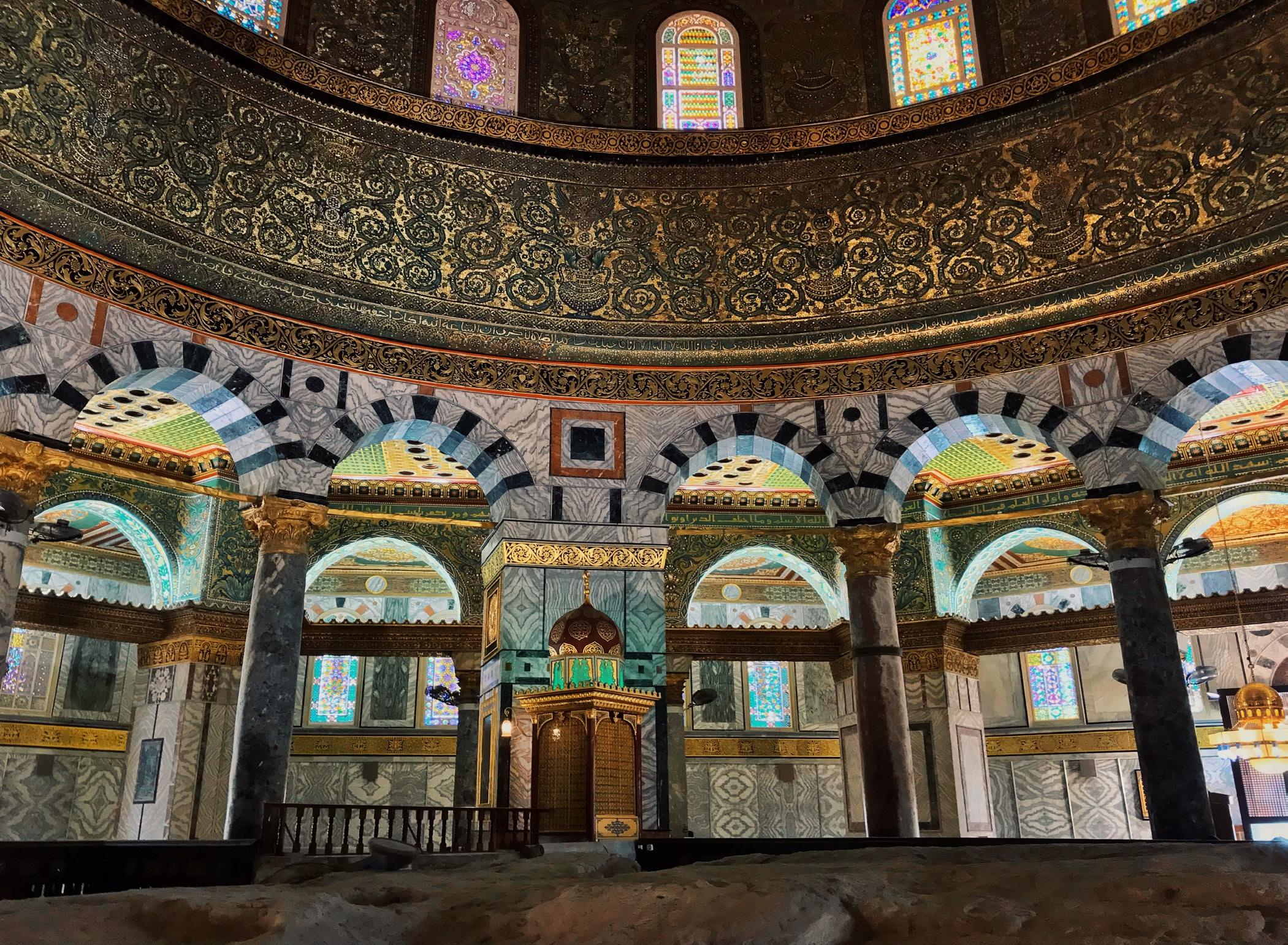
s forward to lead the prayer. Behind him stood all the past prophets, and the angels filled any remaining space. This was a gathering the likes of which the world had never seen nor would see again, a meeting of those closest to Allah. Imagine a packed room of light without a trace of sound. All senses receiving the recitation of the Imam of the Messengers s fulfilling Allah’s command, “When the Quran is recited, listen to it attentively and be silent, so you may be shown mercy” (7:204). His position at the forefront indicated that he was the culmination of all prophethood and the
messenger to all people.
After the prayer, each prophet felt compelled to praise Allah for the individual blessings they received in their lifetimes. One by one, they listed their blessings until they arrived to the last Prophet s, who spoke thus: “Praise be to Allah who sent me as a mercy to the worlds and all of humanity, bringing glad tidings and warnings. He revealed the Quran to me, which is a clarification of everything. He made my community the best community brought forth for mankind, a balanced nation. He made my community the foremost and the last. He expanded my chest, alleviated my

burden, elevated my mention, and made me the opener and the seal.”
While the other prophets were given blessings by Allah, our Prophet s was himself a blessing and a mercy to them!
Exiting the Masjid, he was presented with four cups of varying drinks as a test on behalf of his ummah. Sayyiduna Jibrīl congratulated him on choosing milk, a pure and nourishing drink, symbolizing his pure nature (fitra) and that his deen is consistent with pure nature. Isrā’ forever strengthened the symbolic and physical connection between Masjid alHarām and Masjid al-Aqsā. Both locations are deeply tied to the prophets and Allah’s worship. The foundations for both were built initially by Sayyiduna Ādam. Later, Sayyiduna Ibrāhīm would rebuild and sanctify both masājid with his sons Ismāīl and Ishāq, respectively. Generations of prophets made it a place of worship of the One Allah. And now, the Prophet s connected the two in this night journey. Thus, Muslims are dutybound to revere, visit, and defend both places. May Allah the Exalted never allow impure hands to come upon them.
Thereafter, the Prophet s ascended with Jibrīl through the heavens. We should pause here for a moment to try to understand the magnitude of this moment. The heavens have been above the earths since the creation of the universe. During this miḤrāj (ascension), what transpires now is a onetime event for the universe. It is the moment when the earth and the heavens reach out to one another. They came together to honor a single creation, one who is a mercy for everyone above and below.
At each stop, the angels of that heaven welcomed him joyously and guided him to the prophet of that heaven. In order, he met his father Ādam, the cousins Yahyā and ‘Īsā, and his brothers Yūsuf, Idrīs, Hārūn, Mūsā,
and Ibrāhīm, Allah’s peace be on all of them. From here, he ascended further to the Sidrah al-Muntahā, a station where everything ascending from below and everything descending from above must stop. He was shown both the beauty of Jannah and the horrors of Jahannam.
The pinnacle of this journey was being in the presence of Allah and communicating with Him without an intermediary or screen. Enjoy the idea that our Prophet Ḥ was granted an honor never known before. Leave words and thoughts aside for they fail in describing the event. A poet described his frustration thus: I saw what lies beyond mere sight, Ask not of its nature, for it cannot be described. In that realm, there is neither quantity nor quality, No bounds of less or more can contain it.
I then heard a voice without sound, A speech filled with layers of meaning and mystery.
There is no awareness from the mouth or tongue, No speech or expression can accompany it. Instead, suffice with Allah’s description, “Thus [Allah] revealed to His slave what He revealed” (53:10). However, the way of Allah is that he grants no favor to our Prophet s
Allah the Exalted praised our Prophet s thus:
“I have taken you as my close friend and beloved. It is written in the Torah that you are the Beloved of the Merciful. I have sent you to all people as a bearer of glad tidings and a warner.
without also granting honors to his ummah. He gifted us the daily prayers so that we could stand in His presence as well, the last verses of Surah al-Baqarah in duhā form, and ultimate forgiveness for every person of his s ummah free of shirk.
Allah the Exalted praised our Prophet s thus:
“I have taken you as my close friend and beloved. It is written in the Torah that you are the Beloved of the Merciful. I have sent you to all people as a bearer of glad tidings and a warner. I expanded your chest, removed your burden, exalted your mention thus, I am not remembered except you are remembered with Me. I have made your ummah the best nation ever brought forth for humanity. I made your ummah a balanced nation, and the foremost and the last. Your community’s sins are not counted until they testify that you are My servant and My messenger. I have made some of your followers such that
their hearts are like gospels. I have made you the first of the prophets in creation, the last in being sent, and the first for whom judgment shall be rendered. I have granted you the seven oft-repeated verses (Surah al-Fātihah), which I have not granted to any prophet before you. I have granted you

the concluding verses of Surah Al-Baqarah from a treasure beneath the Throne, which I have not granted to any prophet before you. I have granted you Al-Kawthar. I have granted you eight merits: Islam, migration, striving in the way of Allah, prayer, charity, fasting in Ramadan, enjoining good, and forbidding evil. And, I have made you the opener and the seal.”
The Prophet s was then escorted the

way he came, descending through the heavens to Masjid al-Aqsā and from there to Masjid al-Harām by the burāq.
In the morning, he informed every ear what had transpired of blessed events. The news of this incident separated the true believer from the disbelievers, the wheat from the chaff. The unfortunate fell into disbelief, whereas the fortunate strengthened their resolve. Sayyiduna Abū Bakr, upon hearing the news, immediately confirmed it and earned the moniker the Siddīq. The Prophet s, now reinvigorated and his Companion now elevated further in status, set out to meet the people of Yathrib, who would turn out to be the greatest of helpers. a